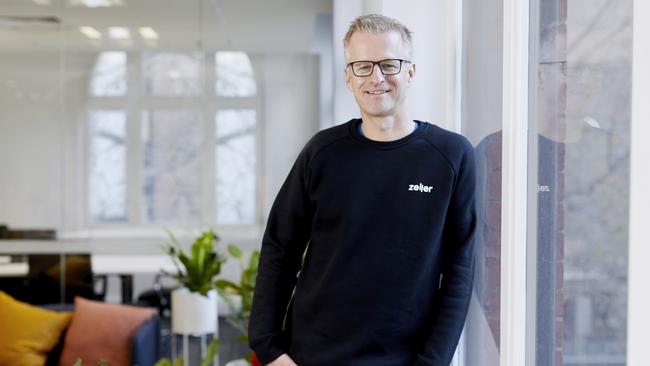Fintechs struggling to find workers as lockdowns bite
Fintech companies are urging the government to take action over the crippling skills shortage sparked by the borders closing 18 months ago.

Fintech companies are urging the government to take action over the crippling skills shortage sparked by the borders slamming shut 18 months ago, warning Australia is at risk of falling behind its global peers if nothing is done to boost migration.
With borders closed since the pandemic hit in March 2020, Australian technology leaders have been in a war for talent as they race to scale up and take advantage of the unprecedented level of capital flooding the market.
And while the fiery hiring war has forced many to get creative with their salary packages, the relentless hunt for skilled staff risks putting Australia at a disadvantage if the government sits on its hands once the border opens, Zeller CEO and co-founder Ben Pfisterer warned.
“The government needs to be really proactive in incentivising people, a) to stay in Australia; and b) to import talent,” Mr Pfisterer said.
“There are other countries that will be getting ready for this and will be planning for it, whether it‘s tax incentives, training incentives, or company incentives to grow talent and import talent, that will happen. As a country and an economy we have to be ready for that.”
Payments fintech Zeller, which Mr Pfisterer launched in early 2020 just before the pandemic hit, now has staff scattered across the globe, with employees based in India, the Philippines, the Ukraine and Vietnam due to the border closures.
“If we weren’t in Covid-19 times, if the border’s weren’t closed, we would be actively chasing talent from new markets and hoping to attract them to Australia,” the former Australian head of Square said.
“When you’re building a company from scratch, there’s nothing that’s going to beat brainstorming in a room: a bunch of people thriving off each other, pushing each other to great heights. In an early stage company that is the best possible outcome to have.”
The government needs to act to fast-track skilled workers into the country, he said.
“If we don’t attract and constantly review the way we attract global talent, it will be a negative pull, there’s no doubt,” he said.
Tic:Toc CEO Anthony Baum said the nation risked falling down the international rankings as a fintech hub if skilled tech workers aren’t prioritised by the government.
“We’ve done a fantastic job, we really have. We’re creating significant companies in the fintech sector, and in the technology sector more generally. We’re on the world’s radar now with respect to capital now in the technology fintech space.
“Why are we not taking advantage of that? It would be a real shame if we didn’t maximise that opportunity.”
Like others, Tic:Toc has resorted to hiring from overseas with the intention of bringing those employees to Australia once borders open.
It is also now exploring using offshore suppliers and contractors to offset the local talent squeeze.
“We’ve never used contractors or suppliers before, everyone has always been an employee. Our plan was to retain that strategy but we will now contemplate partnering (with suppliers overseas) in the years ahead as we continue to grow and scale.”
At its current growth rate, Tic:Toc is onboarding 20 or 30 people a quarter, he added.
Kanopi CEO Nigel Fellowes-Freeman said the skills shortage was a major challenge, not just for the fintech sector but for the economy overall.
“We’re looking to hire right across the realm of the company, from engineering through to product, sales. It’s really tough right now … we can‘t get anybody into the country.”
The digital insurance platform has had staff working in the UK for the past two years as they wait for the borders to open.
“The problem is that the digitalisation of the economy is happening more and more, and so the work is growing, companies are getting funded and so requirements for staff are increasing, but the pool of talent hasn’t increased with it.”
Start-ups then run the risk of not hitting their growth targets if they can’t hire enough staff, Mr Fellowes-Freeman warned.
“Even when we open up borders there’s going to be a lag and a peak in demand to get that talent. So I think the sector will be fighting to get back on par with its international cousins from where we were (pre-Covid-19), he said.
Base salary expectations, meanwhile, have shot up, climbing as much as 50 per cent over the past 12 months for in-demand roles, he said, putting further pressure on the sector.
Westpac-backed payments start-up mx51 has hired 15 staff since June, with 11 roles still open and a further 15 expected to be needed in the fourth quarter.
The payments-as-a-service fintech raised $25m earlier this year and has been rapidly scaling up since.
“We’re finding it a real struggle right now,” CEO Victor Zheng said of the search for staff.
“The closed borders are filtering out migration and then on top of that is the growth of tech in Australia right now.”
Like Tic:Toc, mx51 has turned to outsourcing to fill the skills gap and is currently trialling a new long-term strategic partnership with US-based software engineering company EPAM.
Like others, mx51 is also dealing with higher salary expectations across the market.
“We can’t compete with the likes of Atlassian from a salary perspective but what we do is we do give employee share options. People are becoming more aware of employee share options, and so that’s working well for us,” he said.





